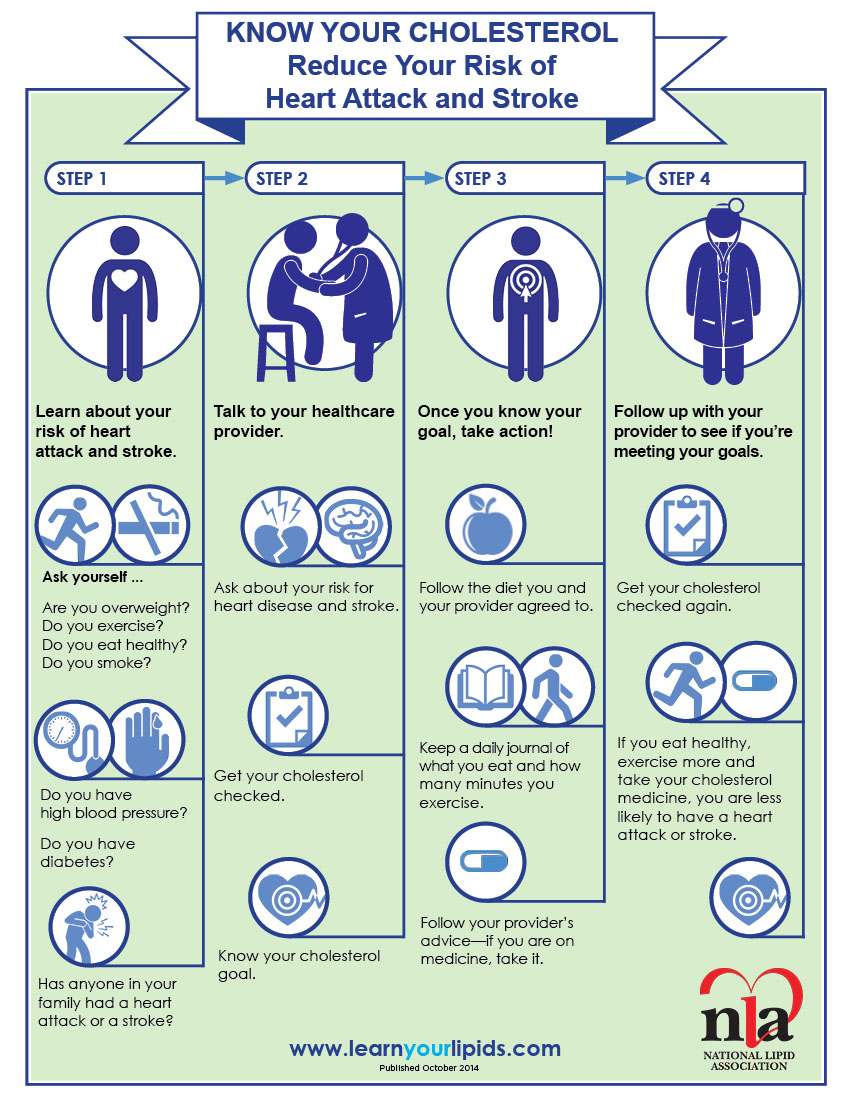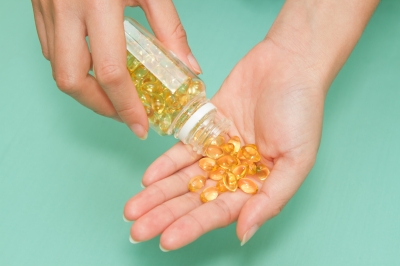Reduce Your Risk of Heart Attack and Stroke (infographic)
 An infographic by National Lipid Association.
An infographic by National Lipid Association.
Reduce Stroke Risk with Vitamin E Derived from Palm Oil
 Dr. Joseph Keenan retired as a Professor of Family Medicine at the University of Minnesota. He holds a joint professorship in the University of Minnesota School of Food Science and Nutrition. Dr. Keenan is considered one of the leading national experts in the field of nutritional supplement research and cardiovascular disease. He is now practicing emergency medicine, and continues teaching and consulting is his areas of research interest which include preventive cardiology.
Dr. Joseph Keenan retired as a Professor of Family Medicine at the University of Minnesota. He holds a joint professorship in the University of Minnesota School of Food Science and Nutrition. Dr. Keenan is considered one of the leading national experts in the field of nutritional supplement research and cardiovascular disease. He is now practicing emergency medicine, and continues teaching and consulting is his areas of research interest which include preventive cardiology.
Lisa Nelson, RD: What is white matter, and how is it related to stroke?
Dr. Keenan: “About 50 percent of your brain is made of white matter, which provides connections to the various other brain centers and thus is important for learning and memory. This is also the area of the brain most often affected by “mini strokes”, also called lacunor strokes, which often cause no overt symptoms. But as they accumulate over years, they can affect function and memory.”
Lisa Nelson, RD: What are white matter lesions?
Dr. Keenan: “White matter lesions (WMLs) are abnormal regions in the brain that can be detected by MRIs. They are often found in elderly people, and are associated with atherosclerosis in the small blood vessels of the brain, hypertension and diabetes mellitus. If the condition worsens, WMLs may result in cognitive impairment and dementia.”
Lisa Nelson, RD: Is there any way to weaken the progression of these lesions?
Dr. Keenan: “Results of a two-year human clinical study published in the American Heart Association journal, Stroke, show that vitamin E tocotrienols derived from Malaysian palm oil may be helpful. This is the first study that provides solid evidence of tocotrienols’ neuroprotective benefits in humans.”
Lisa Nelson, RD: The benefits of tocotrienols and stroke have been in the news before, haven’t they?
Dr. Keenan: “Yes. Previous animal studies have reported that vitamin E tocotrienols derived from palm oil are capable of preventing damage to white matter during a stroke, and improved circulation to the damaged part of the brain after a stroke.
Lisa Nelson, RD: Why are healthcare professionals so excited about this study?
Dr. Keenan: “Many other compounds have been shown to display neuroprotective effects in animal models of stroke. But they failed in human clinical trials. This may be because the human brain has so much more white matter (about 50 percent) than rats (about 10 percent), for example.”
Lisa Nelson, RD: How was this study conducted?
Dr. Keenan: “This was a randomized, double-blind, placebo-controlled trial conducted by leading tocotrienol researchers at the University Science Malaysia, Penang, Malaysia. They followed 121 volunteers for two years. Each volunteer underwent MRIs to confirm the presence of WMLs. One group received 200 mg. of mixed tocotrienols twice daily for two years, while the others received a placebo. All volunteers were instructed to maintain their regular diets and physical activity levels. MRIs were performed at entry into the study (baseline), and then repeated after one year and again after two years. At two years of supplementation, the mean WML volume of the placebo group increased whereas those who received palm tocotrienols remained unchanged.”
Lisa Nelson, RD: Are there other reasons to be concerned about white matter lesions, in addition to stroke?
Dr. Keenan: “Brain white matter lesions are also known to be linked to development of other neurodegenerative diseases, such as Alzheimer’s and Parkinson’s disease.”
Lisa Nelson, RD: What is your recommendation, after reviewing this research?
Dr. Keenan: “This study shows that taking palm-derived tocotrienols daily may be an easy way to be proactive about your brain health, especially if you are at high risk for stroke.”
Dr. Keenan says that palm tocotrienols are well researched for their heart-health benefits. Additional studies can be found at www.palmoilhealth.org.
Learn how to make Heart Healthy Changes into Lifelong Habits at http://hearthealthmadeeasy.com.
All the best,
Lisa Nelson RD
Image courtesy of Praisaeng / FreeDigitalPhotos.net
What Bad Habits Are Increasing Your Heart Disease Risk?
 Annually, the American Heart Association (AHA), Centers for Disease Control (CDC), and National Institutes of Health (NIH) publish the latest statistics for heart disease and stroke. The most recent updates found deaths due to cardiovascular disease actually decreased by 33% over the past 10 years and deaths due to stroke were reduced 37%.
Annually, the American Heart Association (AHA), Centers for Disease Control (CDC), and National Institutes of Health (NIH) publish the latest statistics for heart disease and stroke. The most recent updates found deaths due to cardiovascular disease actually decreased by 33% over the past 10 years and deaths due to stroke were reduced 37%.
This goes to show that a significant amount of progress has been made to improve outcomes for those who suffer heart attacks and strokes. Great news!
What’s not so good news are the increasing risk factors of US adults making them more likely to suffer a heart attack or stroke. Did you know 68% of US adults are overweight or obese? Did you know 32% of children are overweight and 17% of children obese? And according to the AHA, CDC, and NIH, 33% of US adults do no engage in any aerobic leisure time physical activity. If you look around, it’s not so hard to believe that a majority of US adults are overweight and sedentary. Where do you fall?
Continue reading
Stroke: Did you know stroke is a major health risk for women?
 I was able to interview Sherry Torkos on the concerns regarding stoke and women and what you can do if you are at risk.
I was able to interview Sherry Torkos on the concerns regarding stoke and women and what you can do if you are at risk.
Sherry Torkos is a pharmacist, author, certified fitness instructor and health enthusiast who enjoys sharing her passion with others. Sherry graduated with honors from the Philadelphia College of Pharmacy and Science in 1992. Since that time she has been practicing holistic pharmacy in the Niagara region of Ontario. Her philosophy of practice is to integrate conventional and complementary therapies to optimize health and prevent disease. Sherry has won several national pharmacy awards for providing excellence in patient care. As a leading health expert, she has delivered hundreds of lectures to medical professionals and the public. Sherry is frequently interviewed on radio and TV talk shows throughout North America and abroad on health matters. Sherry has authored 16 books and booklets, including Saving Women’s Hearts, The Canadian Encyclopedia of Natural Medicine, and The Glycemic Index Made Simple.
Lisa Nelson RD #1: Why should women learn more about their risk for stroke?
Continue reading
Is Your Calcium Supplement Increasing Your Heart Attack Risk?
 Milk is good for the bones – right? Because milk is a good source of calcium and calcium promotes bone strength. Which means you may think a calcium supplement is an even better way to protect your bones – right?
Milk is good for the bones – right? Because milk is a good source of calcium and calcium promotes bone strength. Which means you may think a calcium supplement is an even better way to protect your bones – right?
A new report in the journal Heart, has determined calcium supplements are putting people at greater risk for heart attacks.
Researchers followed 23,980 individuals ranging in age from 35 to 64 years-old over an 11 year period. They saw an 86% increased risk of heart attack for those regularly supplementing calcium. Participants supplementing calcium only were twice as likely to have a heart attack compared to those not taking any vitamin supplements.
Continue reading
Ginkgo to Treat Peripheral Vascular Disease
 Ginkgo is an herbal extract available in supplement form. If comes from the leaves of the ginkgo tree and is believed to improve circulation and cognitive abilities.
Ginkgo is an herbal extract available in supplement form. If comes from the leaves of the ginkgo tree and is believed to improve circulation and cognitive abilities.
Some of the functions associated with Ginkgo include:
Decreased platelet aggregation (blood clotting)
Decreased inflammation
Improved memory and brain function
Improved circulation
Mood Enhancement
Increased serotonin receptors
Increased glucose uptake
Increased oxygen supplied to the brain
Antioxidant
The recommended daily dose of Ginkgo may vary between 60 to 120 mg/day.
There are potential side effects associated with the herbal remedy, such as headaches, nausea, vomiting, and dizziness. If you take blood thinners, such as Coumadin, or monoamine oxidase inhibitors (MAOIs) ginkgo is not recommended. MAOIs are a class of antidepressant drugs. Discuss any supplements you take or are considering with your doctor. There is potential for a drug-nutrient interaction.
There has been some evidence to indicate that Ginkgo can be used to treat a variety of health conditions. A few of the health conditions include:
Continue reading




